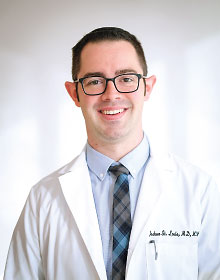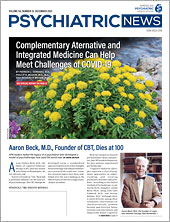The United States has a shortage of physicians who are trained to offer medication treatment with buprenorphine to patients with opioid use disorder (OUD). One community-based family medicine residency program in Massachusetts has shown that integrating patients treated with buprenorphine directly into residency training can help increase the number of graduates prescribing buprenorphine. Layla Cavitt, M.D., a family medicine physician at the Tufts University School of Medicine Lawrence Family Medicine Residency, and colleagues outlined the program’s steps and success in the Journal of Substance Abuse Treatment.
In 2011, the Lawrence residency program integrated mandatory Drug Enforcement Agency (DEA) X-waiver training into the second-year didactic curriculum. (The X-waiver is the special DEA license required by the Drug Addiction Treatment Act of 2000 that allows health care professionals to prescribe buprenorphine to outpatients for treatment of OUD.) Also, family medicine attending physicians began shadowing patients being treated for OUD in 2011. In 2014, the program integrated patients being treated with buprenorphine into resident continuity clinic patient panels, and residents managed two to five patients over the course of their residency, closely supervised by an attending physician experienced in buprenorphine treatment.
“Our approach is one of normalization, where residents have patients on buprenorphine on their patient panel just like they have pediatric patients or patients with diabetes or other conditions,” said Joshua St. Louis, M.D., M.P.H., a researcher involved with the study. He is an attending physician in family medicine at Greater Lawrence Family Health Center.
The researchers analyzed data from the 2016, 2017, 2018, and 2019 National Family Medicine Graduate Survey, focusing on the respondents’ answers to questions about whether they believed that residency prepared them to prescribe buprenorphine and whether they currently prescribed buprenorphine.
Of those who responded to the national survey, more graduates of the Lawrence Family Medicine Residency reported they were adequately prepared to prescribe buprenorphine on graduation. For example, 75% of the graduating class of 2016 reported they were prepared to prescribe buprenorphine compared with 12% of respondents nationwide. In addition, more Lawrence graduates reported prescribing buprenorphine in their practice three years after graduating. All of the graduating class of 2016 reported that they were prescribing buprenorphine three years after graduating compared with 12% of respondents nationwide.
St. Louis said that although he knew the Lawrence residency had a robust buprenorphine program, he was surprised at the stark difference in prescribing among graduates of the program compared with respondents nationwide.
“This is the first time we were able to look at practice patterns of our graduates, and it was exciting to see that the education was continuing in practice a few years out,” St. Louis said. “But when [buprenorphine treatment for OUD] is normalized in your program, it can be hard to remember that it’s not that way for everyone.”
The researchers wrote that it is important to support residents who go on to practice in environments that are less welcoming to addiction medicine.
“So often they hear things like ‘we don’t want patients like that in our practice.’ That would make [a practice] a challenging place to work when you know that patients are there for treatment just like any other patient with any other condition,” St. Louis told Psychiatric News.
He said that many physicians see OUD and other substance use disorders as somehow different from other diseases with respect to making recommendations and offering treatment, but the Lawrence residency program trains residents not to think that way. For example, sometimes residents will seek advice regarding patients who struggle to maintain buprenorphine therapy and ask if they should discontinue the patients’ medication treatment.
“That question doesn’t make much sense when thinking of it in terms of other diseases,” St. Louis said. “If your patients with diabetes are struggling to take insulin, would you want them to stop taking insulin? We need to step back and ask ourselves, ‘Would I be behaving the same way and making the same kinds of recommendations for any other condition?’ If the answer is ‘no,’ then we need to examine why.”
St. Louis added that psychiatrists and primary care physicians need to work together to ensure patients with OUD get the treatment they need.
“The issue is that we are siloed and trying to do the work that is right in front of us, but by being integrated, we can provide better care for patients.”
The researchers reported no outside funding for their study. ■
“Teaching Residents to Prescribe Buprenorphine for Opioid Use Disorder: Insights From a Community-Based Residency Program” is posted
here.

